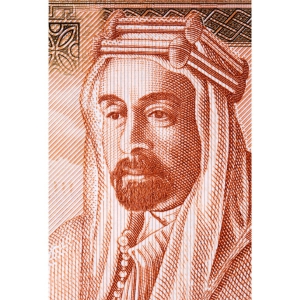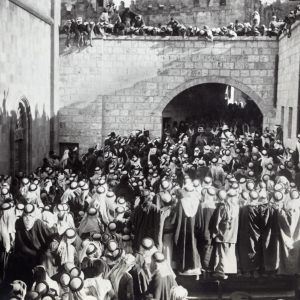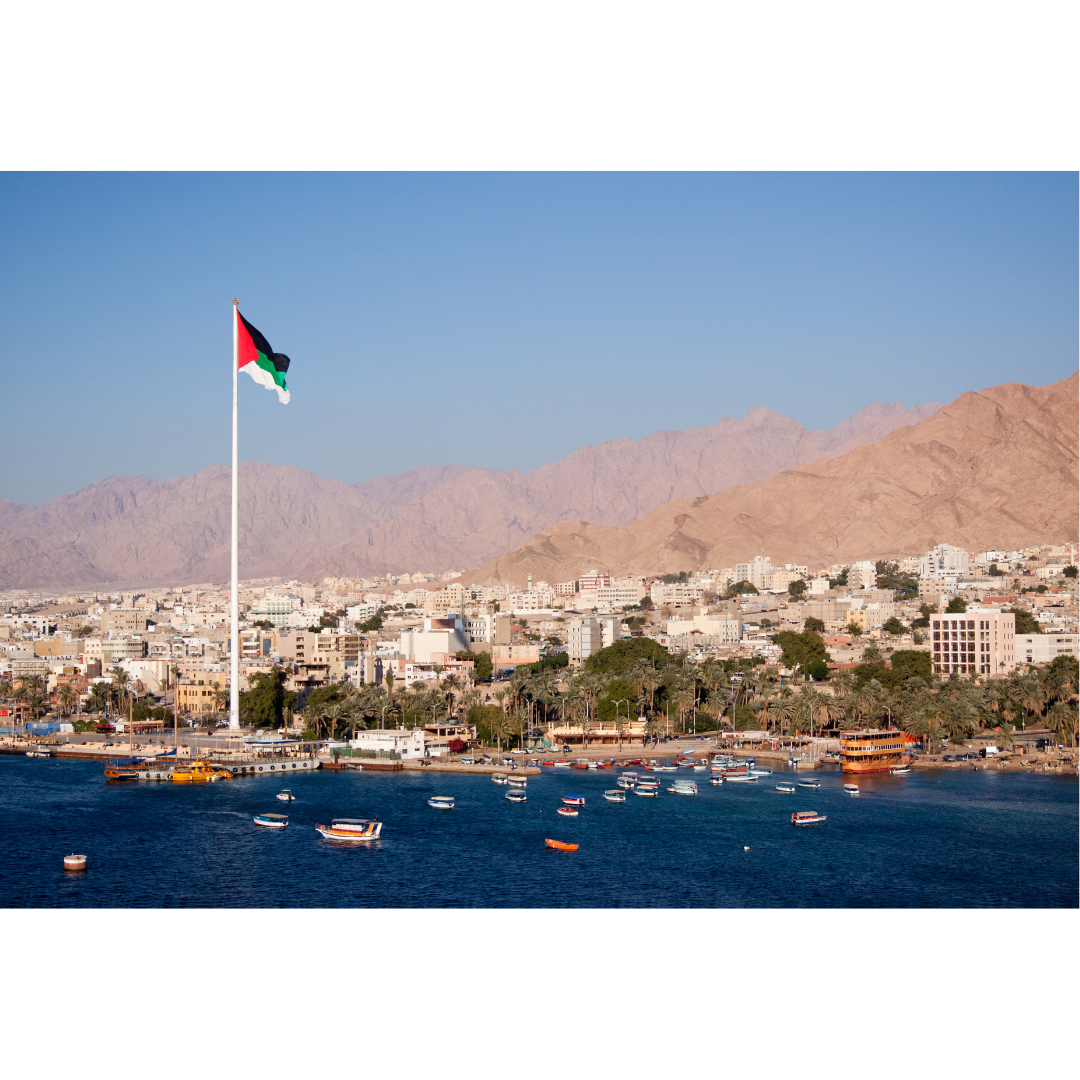In this series, we try to analyze why states in the Levant are still far from being democratic – and what responsibility foreign diplomats – especially Western diplomats – bear.
In the first part of this series, we saw how, at the beginning of the 20th century, European leaders divvied up what was previously the Ottoman Empire. In the process, they drew arbitrary borders that cut across ethnic, sectarian and religious lines, rendering a demographic make-up of these territories that isn’t exactly conducive to a united national identity.
After a few decades of being ruled as colonies or protectorates, most of these newly created states gained independence in the 1930s and 1940s. In this second part of the series, we will look at how exactly these states were set up by the ruling colonies before being left to fend for themselves, as illustrated by the case of Jordan.
In fact, Jordan was established as a British protectorate in 1921, gained independence in 1946, and is now a ruling monarchy – some would even call it a semi-authoritarian state. But why is it a semi-authoritarian state, and why is it so hard for Jordanians to claim a right to self-determination?
The “appointment” of Jordan’s monarchy
Since the whole “promise of Arab independence”-treason (see the Husain-McMahon diplomatic scandal in the previous article of this series) hadn’t gone over very well, European rulers had no choice but to “appoint” rulers that had some legitimacy in the eyes of locals. And yet, since most of these states were created with the intent of ruling them as colonies, it was in the European diplomats’ best interest to have cooperative – or compliant – rulers as Heads of state.
 In Jordan, the Brits “appointed” the Hashemite (then Emir) Abdullah I to sit on the throne of its succeeding Kingdom. As one hand washes the other, it was understood that the new Jordanian monarchy would cooperate with British rule in exchange for being placed on the throne.
In Jordan, the Brits “appointed” the Hashemite (then Emir) Abdullah I to sit on the throne of its succeeding Kingdom. As one hand washes the other, it was understood that the new Jordanian monarchy would cooperate with British rule in exchange for being placed on the throne.
Because the Hashemite family is said to be descendants of the Islamic prophet Muhammed, it had some legitimacy in the eyes of locals. To consolidate that legitimacy and acceptance, however, the new monarchy quickly set out to build a special relationship with the existing tribes in the country, which had until then been the primary rulers in the region. Southern tribes were recruited to work for the state in exchange for privileged access to public goods. In effect, this pact helped the monarchy nurture political allegiance to the throne by building a – still standing – network of clients and intermediaries.
A decades-long oppression of political opposition
Jordan is theoretically ruled under a “parliamentary system with a hereditary monarchy”. And yet, the “parliamentary system” part of that qualification doesn’t exactly live up to its name, as political discourse in Jordan isn’t exactly open. There are two primary reasons as to why that is. The first reason is the nurturing of the aforementioned allegiance with the tribes. The second reason is the religious nature of the strongest opposition parties in Jordan.
 Though the King had originally allowed political parties right after Jordan gained independence in 1946, an attempted military coup by Nasserists and leftist officers in 1957 forced him to introduce martial law, outlaw all political parties, and eventually suspend parliament entirely. As a result of popular riots, the ruling elite was forced to liberalize political parties again. Under the first electoral system, the 1989 block vote, candidates used a couple of their votes to select family members or members of their tribe and the rest of their votes to select candidates affiliated with the Muslim Brotherhood, the best organized political party.
Though the King had originally allowed political parties right after Jordan gained independence in 1946, an attempted military coup by Nasserists and leftist officers in 1957 forced him to introduce martial law, outlaw all political parties, and eventually suspend parliament entirely. As a result of popular riots, the ruling elite was forced to liberalize political parties again. Under the first electoral system, the 1989 block vote, candidates used a couple of their votes to select family members or members of their tribe and the rest of their votes to select candidates affiliated with the Muslim Brotherhood, the best organized political party.
Fearing the influence of the Muslim Brotherhood – which could hurt support for the monarchy – King Hussein quickly introduced a new system in 1993, so that voters would stick to familial and tribal loyalties instead of voting for the Islamist group. This new system, however, excludes leftist parties, youth parties, Islamist parties, and secular parties – all of which are important in building the crucial “loyal opposition” in a parliamentary democracy.
The Islamic Action Front (IAF), the Jordanian faction of the Muslim Brotherhood, is the best-organized opposition today and the most popular party among Palestinian-Jordanian demographics in Jordan. In the first elections after liberalization in 1989, the IAF’s candidates won 42,5% of the seats, the largest bloc in parliament. This success made the regime nervous: to curb its presence in political circles, the regime introduced various targeted electoral reforms, detained and arrested IAF members, and even outlawed the Muslim Brotherhood, declaring it a terrorist organization.
The diplomatic community’s discomfort with Islamist political parties
The international community – especially in diplomatic circles – has had very little issue with such oppression of Islamic political movements. In fact, especially in the West, there is this strong belief that democracy must be inherently liberal. Pursuant to this view, any religious – even worse, Muslim – ideology is considered to be strongly incompatible with democratic coexistence. In fact, many a time, Western nations supported the implementation of a democratic framework in the Levant, and then immediately shut it down when the most successful parties turned out to be Islamic movements.
This liberalist understanding of democracy is the reason why democratization is often branded in the Middle East as an imperialist or Western concept aimed at replacing local history, culture, tradition, and ideals. Thus, some academics have suggested that democracy could also be seen as a vehicle for organized self-rule – without prescribing the vehicle’s destination. In fact, were democracy able to accommodate history, culture, tradition and ideals, there might be a greater chance for democratization to occur organically and incrementally, and thus sustainably – rather than being yet again imposed by foreign nations and their diplomats.
Simply discrediting a political movement because it is linked to Islam disregards the primary reason why Islamic parties are so successful: While autocratic regimes can easily shut down any political platform they deem to be threatening to the status quo, they cannot shut down mosques without risking rebellion. Thus, mosques are often the only remaining fora to discuss and organize political opposition to the ruling elite. Discrediting Jordan’s IAF, purely on account of it being founded on Islamic principles, thus overlooks the fact that, in Jordan’s political landscape, it is one of the political entities most committed to democratic principles and reform since the 1980s, with a political agenda that is almost exclusively issue-based rather than ideology-based.
The Arab Spring
During the Arab Spring, as popular movements on the streets called for more self-determination, Europe and North America showed both enthusiasm and support for the protesters. And while some governments responded with repression and were met with a revolution, Jordan’s King Abdullah II quickly stated that “Jordan’s future dictates that we move forward with democratization to ensure that all Jordanians feel they have a larger say in their government”. To this end, he promised progressive reform, for a peaceful and sustainable transition.
Quickly though, regional instability – primarily civil wars and the threat of terrorist groups – overshadowed the people’s attempts to spark change domestically. The Levant’s ruling elites, including Jordan’s King Abdullah II, reminded Western powers that the topple of regimes – or even just a reshuffling of the cards – would come at the cost of regional security. The autocratic ruler of a controlled police state, they argued, can respond to the terrorist threat and the rise of Islamist movements in a much more efficient way than any newly born democracy could.
Especially in Jordan – surrounded by Iraq, Palestine and Israel, Syria, Egypt, Lebanon and Saudi Arabia – the monarchy could argue that only it could sustain the delicate balance it had maintained for decades.
Again, we could ask ourselves if democracy seemed too much of a gamble for Western powers. Especially in Europe, terror attacks and seemingly never-ending flows of migrants reset the diplomats’ priorities in the Middle East. Support for the popular uprisings quickly disappeared, leaving protesters alone to face the repressive regimes they had hoped to put an end to.
And though Jordan’s monarchy implemented a series of reforms of the electoral system that would theoretically open the door for organized political parties rather than just tribal leaders, these reforms were not truly designed to bring about change. In fact, these last elections were some of the least democratic elections in Jordan’s recent history and cost Jordan a status change from “Partly Free” to “Not Free” in Freedom House’s 2021 and 2022 ratings.
Conclusion
To summarize, the British appointed the Hashemite dynasty to rule Jordan, knowing full well that an autocratic ruler and strategic handwashing would maintain their influence in the region. The new monarchy quickly made a pact with tribal leaders to ensure their loyalty – a pact that was nurtured for decades to come by excluding any other actors from political discourse. Any political party organized well enough to threaten the King’s autocratic rule was then oppressed on account of being supposedly extremist – a rhetoric that resonated with the international community. The argument of regional instability also proved successful in shutting down international support for Jordan’s Arab Spring and the thousands of Jordanians that took to the streets to protest the monarchy’s autocratic rule and the tribal networks of corruption.
And yet, when discussing the lack of democracy in Jordan, we conveniently (consciously or not) overlook the responsibility of Western governments and diplomats in laying the foundations of this autocratic system 100 years ago and the nurturing of that system as recently as the last decade.
Sources :
Alfred Stepan, Juan J. Linz, and Juli F. Minoves. “Democratic Parliamentary Monarchies.” Journal of Democracy Vol. 25, no. 2 (April 2014): 36.
Andrew Reynolds and Jordan Elklit, “Jordan: Electoral System Design in the Arab World” in The International IDEA Handbook of Electoral System Design (Stockholm: International Institute for Democracy and Electoral Assistance (IDEA), 1997): 53.
Curtis R. Ryan, Jordan and the Arab Uprisings: Regime Survival and Politics Beyond the State (New York: Columbia University Press, 2018): 24.
Dima Toukan, “Jordan’s New Electoral Law Disappoints Reformers” Carnegie Endowment for International Peace (22 June 2010).
Dirk Kunze, “Jordan Votes: Symbolic Ritual or Indicator of Change”, Friedrich Naumann Foundation, (9 November 2020).
Foreign Policy Research Institute, Country Profile: Jordan : Understanding Electoral Systems in the Middle East and Beyond, September 2015: Footnote 1.
Freedom House, “Freedom in the World 2021: Jordan”, 2021.
Freedom House, “Freedom in the World 2022: Jordan”, 2022.
Jillian Schwedler, “Jordan : The Quiescent Opposition”, Wilson Center (August 27 2015).
King Abdullah II of Jordan, Our Last Best Chance: The Pursuit of Peace in a Time of Peril (New York: Viking, 2011): xvii and 174-175.
Kristen Kao and E.J. Karmel, “The pandemic compromised Jordan’s parliamentary elections”, The Washington Post (20 November 2020).
Mohammed Hussainy, “The Social Impact of Jordan’s Electoral System: Policy Paper” (Amman: Friedrich-Eber Stiftung Jordan and Iraq, March 2014): 10.
Nadine Picaudou, Visages du politique au Proche-Orient, (Paris : Editions Gallimard, 2018) : 247.
Omari Raed, “New elections bill sheds one-vote system” The Jordan Times (1 September 2015).
Osama Al Sharif, “Political Life Waning in Jordan with Death of Centrist Party”, Middle East Institute (24 October 2017).
Osama Al Sharif, “Voter apathy, pandemic result in low turnout, riots in Jordanian election”, Al-Monitor (12 November 2020).
Sean L. Yom “Jordan: The Ruse of Reform” in Democratization and Authoritarianism in the Arab World, Larry Diamond and Marc F. Plattner, eds. (Baltimore, MD: John Hopkins University Press, 2014): 354.
The Constitution of The Hashemite Kingdom of Jordan of 1952 (including 2011 revisions).

